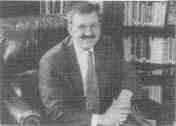 |
Home | Search | Browse | About IPO | Staff | Links |
 |
Home | Search | Browse | About IPO | Staff | Links |
|


Proper role of government
properly gels more scrutiny by Ed Wojcicki As a local government reporter years ago, I followed a feud between the school district and other local officials. The fight was over the name of the high school baseball field. The school district gave it one name, but other officials wanted a different one, and all disagreed on who had a right to name it. The district prevailed, but one night somebody entered the park and painted over the sign bearing the new name. I called the superintendent. "That action won't affect the quality of education in the city today," was all he said in response to the vandalism. I was tickled, and I'll never forget it. Naming facilities and buildings is among the most benign of government responsibilities. But the human interaction that is part of all governmental activity sometimes makes it inevitable that serious philosophical disputes will arise on issues big and small. The proper role of government is being debated at all levels. In Chicago, state and city officials grapple with the Chicago Bears' desire for a new and improved stadium. Illinois communities compete with each other for jobs emanating from the construction and operation of state prisons. And Gov. Jim Edgar's vision — mentioned several times in his State of the State address — is one not of "more government, [but] better government." All of these topics, addressed in this issue, revolve around that theme of what government should or should not be doing. What is the proper role of government? In Illinois, on the big issues, there is no consensus. In December our Question of the Month asked whether you would support some state and local tax increases to offset proposed cuts in the federal budget and subsequent reduction of services in Illinois. By a 3-2 margin, our readers opposed higher state taxes. A Brighton reader summarized well what many others said: "Increasing state and local taxes defeats the purpose of federal budget and tax cuts, which is to pump more money into the economy." Many said the federal budget is so bloated that cuts would not result in a reduction of essential services. However, several readers who would not object to state tax increases also want simultaneous property tax relief.
And one reader, a former state senator, says a tax increase is needed so that
Illinois doesn't fall farther behind in
providing essential services in health
care, education and crime. This former
official asked, "Do we really believe
that an administration which is afraid
to implement motor-voter will find the
courage to deal responsibly with block
grants?" *
Illinois Issues February 1996 * 3 |
|
Sam S. Manivong, Illinois Periodicals Online Coordinator |